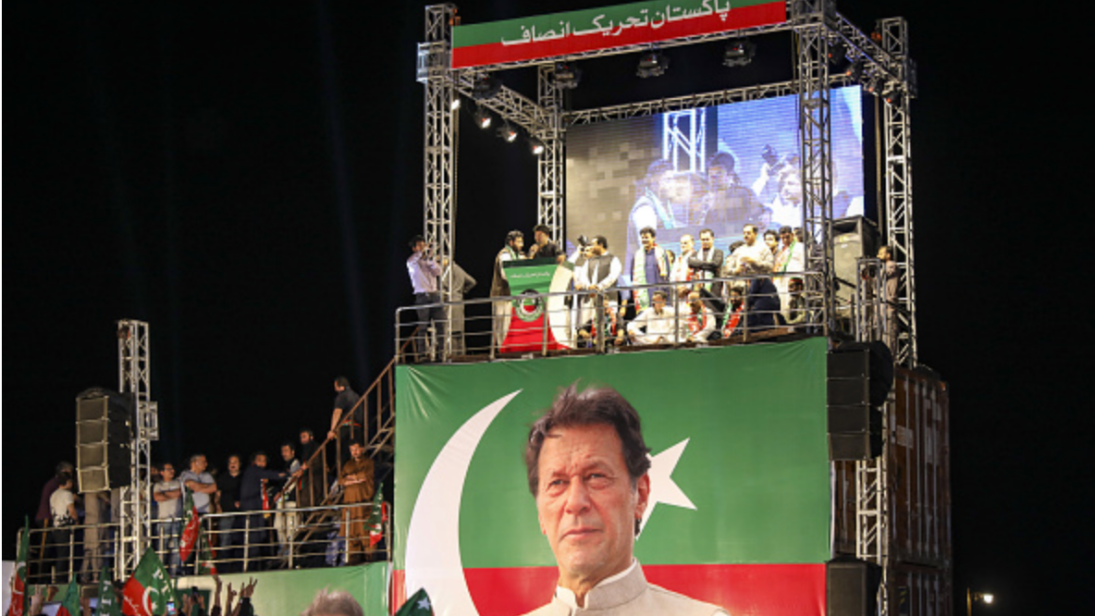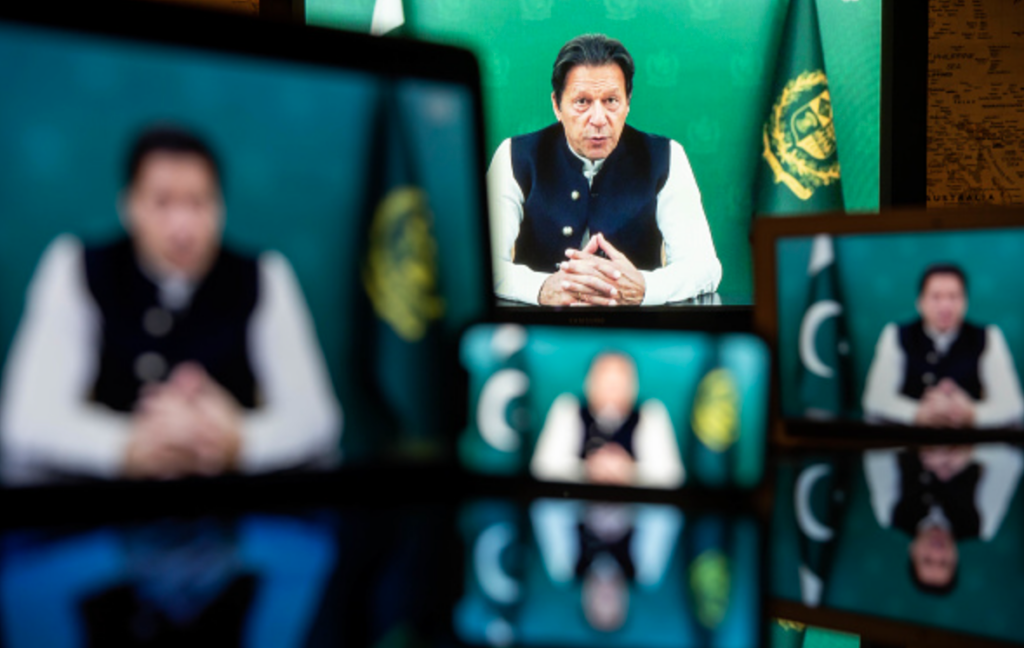
For the first time in the history of Pakistan, a Prime Minister has been deposed through the Vote of No Confidence (VoNC). The no-confidence motion placed in Pakistan National Assembly on March 8, which required 172 votes in the 342-seat parliament to pass, was supported by 174 politicians. As a result, former Prime Minister Imran Khan was ousted from office on April 10. The days leading to the VoNC and the following days embroiled Pakistan in an unprecedented political crisis. The political frenzy involves an alleged “foreign threat to oust Imran Khan’s regime,” contempt of constitutional process, filibustering of the proceedings of the National Assembly, massive popular support for Imran Khan in his rallies post VoNC despite constitutional violation and break-up with the establishment. This has polarized the Pakistani society into two extreme binaries—often two sides of the same populist coin—where one camp views Imran Khan as a dangerous demagogue and the other views him as a Messiah.
The Trends of Populism
As populism is on the rise across the world—from Donald Trump and right-wing politics in the United States to Prime Minister Narendra Modi and the Bharatiya Janata Party in India—Pakistan has not been left unscathed. Though each brand of populism boasts unique variations, what emerges in all of them is a post-truth reality. Central to political jolts in Islamabad—and the recent ouster in particular—is Imran Khan’s populist rhetoric. Khan’s support is not localized or restricted to a particular socio-economic group or religious class. Despite his failure to deliver on promises he made, poor governance, failed economic policies, and a muddled foreign policy, public support for Imran Khan remains undeterred. In fact, it seems to have only increased in light of the VoNC. In that we see the true power of populism: it becomes deadly when it binds its followers in a narrative where they can see no other truth than their “truth.” What matters more for Khan’s staunch supporters is not his policies or governance but his self-projected role of a “messiah” (savior) devoted to protect people of Pakistan from the evils “corrupt” opposition now the current government of Pakistan and “the West.”
Populism becomes deadly when it binds its followers in a narrative where they can see no other truth than their “truth.”
Imran Khan came into power in 2018 with the dream of Naya Pakistan (New Pakistan) and slogans of fighting corruption, bringing reforms and changes that had never before featured in the country’s history. A famed playboy cricket star turned politician, Imran Khan’s popularity has spread beyond the borders of Pakistan. Throughout Khan’s political career, his political language has been distinctive and his communication style casual. He appeals to the common citizen of Pakistan. Swirling his Tasbeeh (beads) around his fingers almost every time he makes a public appearance, Khan connects with the religious sentiments of the Pakistani nation and appears as an immaculate Muslim. Centering Islam in his governance paradigm has been one of the primary features of Khan’s politics. Combining a visible Islam with anti-elitist rhetoric, Khan’s modus operandi while in government was a maverick, confrontational politics.
The Infamous “Threat” Letter: Between March 7-31 2022
The VoNC and ouster may have already morphed from a crisis turned opportunity for Pakistan Tehreek-e-Insaf (PTI). Fluttering the diplomatic cable indicating a “foreign threat” against his regime won Khan support and sympathy from the masses. Anti-American sentiment has a history in Pakistan but it has developed considerable strength and at a fortuitous time as a result of Khan’s rhetoric. Anti-American rhetoric both rallies his support base for the next elections and also taints the image of his opponents as renegades. Representing himself as the voice of the silent majority of Pakistanis, Khan used the letter to his political advantage while the VoNC hung over him. Received on March 7, the letter’s contents were only revealed to journalists on March 30. Some analysts believe its contents were only shared when Khan sensed he would not survive the VoNC, after the Muttahida Qaumi Movement (MQM) announced its decision to join the opposition on March 30, 2022.
Why did Imran Khan wait to disclose the threat? Important developments between the United States and Pakistan around the same time help contextualize the decision. For the first time in three years, U.S. and Pakistani air forces held a joint exercise, Falcon Talon 2022, at a Pakistan Operational Air Force Base. The exercise was the fourth of its kind, with previous versions held in 2019, 2011, and 2009. It came at a key moment as the United States and Pakistan marked the 75th anniversary of bilateral relations. On March 8, the Federal Secretary of Commerce, Muhammad Saleh, co-chaired a meeting along with Christopher Wilson, Assistant U.S. Trade Representative, focusing on revitalization of economic and trade ties. On March 22, U.S. Under Secretary of State Uzra Zeya was invited to attend the OIC Foreign Ministers Conference. If the threat was so imminent for Pakistan, Imran Khan could have pursued an early course of action. Perhaps he held off as it may not have bode well with the military leadership to have the exercise and the OIC conference sabotaged.
The details about the letter remain elusive to date for the public while National Security Committee reiterated that no conspiracy was found. Even so, the majority of Pakistanis have already accepted it as a reality. While some may consider the letter an intelligent political move by Khan to swell his vote bank ahead of anticipated early elections, political turmoil carries a high diplomatic cost for Pakistan. The VoNC also indicates a rupture in civil-military balancing act—a key and consistent dynamic throughout Imran Khan’s tenure.

The Consequences
The fact that Imran Khan and his brand boast such popularity despite his removal from power is about the success of his populist strategy. This is primarily because his rhetoric energized the public on two of the most influencing factors in Pakistani politics: religion and anti-Americanism. Revealing of his populism is the fact that arguments are framed not in terms of his government’s successful policies—especially the management of COVID-19 pandemic, Ehsas program, and the launch of the National Health Card—but in a refusal to acknowledge his government’s failings.
In a healthy democracy, people across the political spectrum should hold their leader accountable for failed policies as much as they celebrate effective ones. But among Khan’s support base, there is knee-jerk opposition to anyone critical of Khan. What makes him a demagogue is the populist narrative that shuns and out rightly tags anyone disfavoring Imran Khan as a “traitor” regardless of their background or party affiliation. Populism is a precarious and volatile political mode because it leads people to fall prey to charisma and rhetoric and helps powerful people evade accountability, both of which threaten the very core of democracy.
What makes him a demagogue is the populist narrative that shuns and out rightly tags anyone disfavoring Imran Khan as a “traitor” regardless of their background or party affiliation.
Most worrisome is the post-truth politics Imran Khan imbibes, which has polarized Pakistani society to a dangerous level. The political tussle is not within the parliament but has reached the streets of Pakistan. In ancient England, the notion of sovereign’s immunity was a derivative concept from the maxim “Rex non potest peccare” which means “the king can do no wrong.” This seems to capture popular support for Imran Khan perfectly, while his performance for 3.5 years in government has been conveniently forgotten and forgiven. For Imran Khan must practice what he preaches in holding his political opponents accountable by accepting legitimate critiques of his governance and policies and adopting a less inflammatory, more participatory approach to politics.
***
Image 1: Bloomberg via Getty Images
Image 2: Bloomberg via Getty Images


